Bristol's van dwellers suffer as cost of living bites
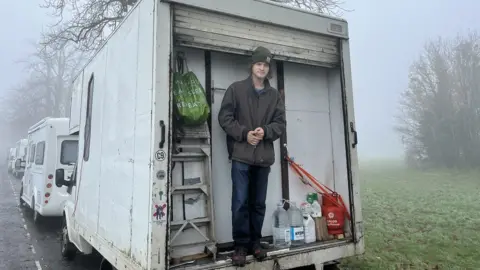 BBC
BBCVan dwellers have revealed how the cost of living crisis is hitting their seemingly low-cost lifestyle.
With everything from the price of food to fuel going up, several people living in vehicles around Bristol have explained how it has affected their lives.
Joshua Lane has lived in a van for the past 18 months after struggling to make ends meet in a flat share.
He said that the lifestyle is not as cheap as when he started.
The 28-year-old, who is originally from Avebury in Wiltshire, said everything had "gone up a lot in price".
"(Bags of) wood have almost doubled," he explained.
'Scraping by'
"Before you could get a bag for about £5 now it's about £8. I've got a gas oven and gas is very expensive now too.
"My van does around 15 miles per gallon and diesel has gone up a lot which has affected me and I run a generator which costs around £200 to £300-a-month.
"With the price of fuel going up - that has cost me a lot more."
Mr Lane bought his Luton van for £3,000 last December. Before that he lived in a Citroen Berlingo van for around six months.
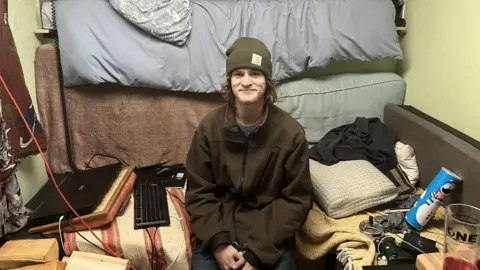
Despite this, the former chef - who ditched his "stressful" job after having open heart surgery - has no plans to change his way of life.
"I was scraping by before. I was head chef at one point and I worked for quite a few employers and I got fed up with working for very little," he said.
"This is a greater way of living. I get a lot of sleeping problems and sleeping in a vehicle is a lot nicer."
He explains that he now works as a driver as well as selling antiques.
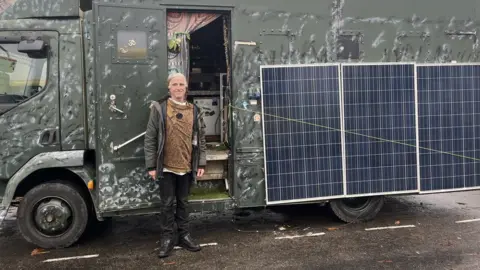
And despite the increase in costs, he still requires a lot less money than before meaning he only "works when he wants".
Gary Tubby has been stuck on Clifton Downs for around six weeks after an engine control unit on his DAF van broke.
The former prison vans are no longer built so he has been scouring scrap yards around the south west trying to get a replacement that works.
The 60-year-old, originally from Kent, has lived in his van for 11 years and usually tours around small festivals in the summer where he uses his solar panels strapped on its sides and roof to power their stages.
Mr Tubby explained that he made a decent living before the pandemic but since it erupted in 2020 it has "collapsed and I've made nothing".
He has also suffered from rising fuel prices, with it costing around £270 to fill his tank - far more than the £120 it cost before diesel prices spiked.
"It's more than doubled," he said. "I've got 19kg gas bottles and they've gone up for £30 to about £60 now."
But much like Mr Lane, he has not intention of stopping his lifestyle.
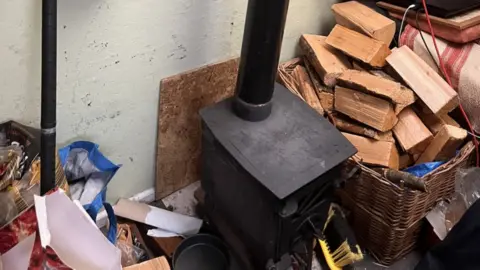
"It's brilliant and the best fun I've ever had," he said. "I just I hope that I can do it for another 10 years."
Aidan Cassidy works for community union Acorn which campaigns for better quality and more affordable housing.
'No other option'
He said it was "absolutely 100%" the case that the number of van dwellers in Bristol has increased over recent years as rents have risen.
He explained that a common view that people in Bristol are hippies pursuing bohemian lifestyles is wrong and "many people have no other option".
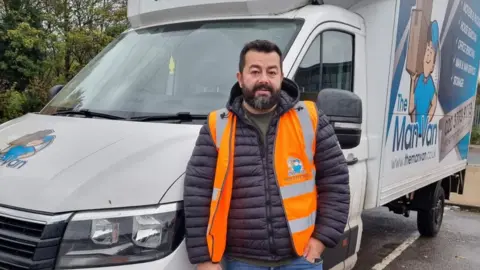 Supplied
Supplied"Some people have been evicted and have no other choice," he explained.
Washington Carrato owns removal company The Man Van and revealed that he receives "at least" two to three calls a week from people wanting to buy vans to convert into homes.
The 43-year-old explained that when he started his company almost 20 years ago it was "unheard" of but now people often offer him "silly money" for one of his Mercedes Sprinter or Luton vans.
"They say they need it to convert into a home because they can't afford to live any other way," he said.

Mr Carrato says he understands why people are adopting the alternative mode of living - especially in cities where house prices tend to be higher.
"We are struggling to buy new vans and there are not a lot on the market at the moment - especially good ones," he said.
"Before the pandemic it was a lot easier but things are just getting harder and harder now."
Christo Machon is the founder of performing arts YardArts and has lived in vans and other vehicles for more than 20 years.
He said that "poverty is the main cause for people opting out of traditional housing".
 Supplied
Supplied"Some people have for sure chosen 'van life' because they can no longer afford rent and bills," he added.
"Others as a lifestyle choice. Some can cut it, some really can't. The 'community' has changed as there are more people choosing it as an alternative. The proliferation, as in the past, has and will cause conflict.
"It's a complex situation that is seriously missing the right kind of conversation around it."
Despite this, he said that he is lucky because "there are people in uninsulated, un-heated, often unsafe vans and caravans, living hand to mouth on the streets of Bristol".
"In short, there are many, many layers and different groups that live this way.
"Some of our challenges are the same, many are different."
"For instance, someone living in social housing cannot be compared to someone living in a designer apartment in Chelsea, just because they're both houses.
"The same principle can be applied to the so-called 'travelling community'."

